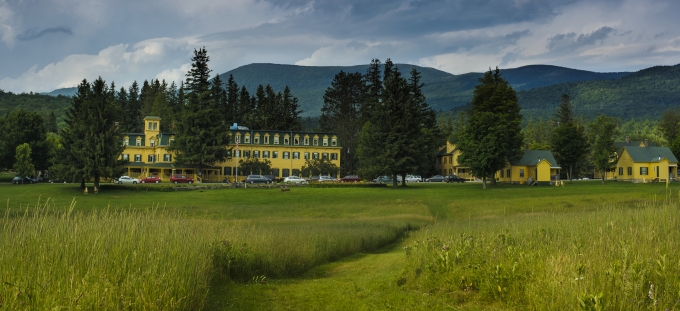Banks, Sullivan Join BLSE Faculty
0May 14, 2014 by Tom McKenna
 Editor’s note: This piece is re-posted from the Spring 2014 Bread Loaf Newsletter.
Editor’s note: This piece is re-posted from the Spring 2014 Bread Loaf Newsletter.
Two outstanding new faculty members will join the Bread Loaf community this summer. To help you get to know them better, we’ve provided short bios below. We also were able to catch up with Robert Sullivan to ask him a few questions.
Adam Banks
This summer, professor of writing, rhetoric, and digital studies at the University of Kentucky Adam Banks will collaborate with professor Andrea Lunsford to bring Bread Loaf students a workshop/seminar-style course on writing and literacy in the digital age. Joining Bread Loaf as the first Rocky Gooch Visiting Professor, Banks has also been a visiting scholar at MIT and the University of Kansas, where he taught courses on African American rhetoric, new media, and technologies. He sees his scholarship as “a committed search for the ideas, epistemologies, and strategies African Americans have employed in their pursuit of liberation; the ways that technology issues inform and intersect with that pursuit; and the language to bring those pursuits and traditions to academic, civic, and often ignored Black communities.”
In his book Digital Griots: African American Rhetoric in a Multimedia Age, Banks shows how African American storytelling traditions and their digital manifestations can help scholars and teachers shape composition studies. His award-winning book Race, Rhetoric, and Technology: Searching for Higher Groundchallenges teachers and scholars in writing and technology fields to explore the depths of black traditions more thoroughly, and it calls on African Americans to make technology a central area for struggle. Banks finds ways to engage his Lexington, Kentucky, community by offering free courses that share his vision for a new digital-literacy-based activism.

Robert Sullivan
Author of several books, including Rats, The Meadowlands, A Whale Hunt, The Thoreau You Don’t Know, and My American Revolution, Robert Sullivan will teach a course on creative nonfiction at the Bread Loaf/Vermont campus this summer. Sullivan is a contributing editor to Vogue and regularly writes for the New Yorker, New York Times Magazine, A Public Space, and others. Called an “urban Thoreau,” Sullivan is redefining conceptions of rural and urban spaces.
BLSE: How did you get your start
in writing?
RS: I was not thinking about writing in college; I had plans to be a musician. But I took a course on the Hudson River School painters, and it made me very interested in American art and writing. I still like to think of being a writer as more like being a musician than anything else. Never let up on the fundamentals, change things up, and surprise people, but always work hard to find the perfect, most appropriate, most excellent groove.

BLSE: Your course focuses on writing about place. What led to your interest in investigating places such as the innards of a city or the habitat surrounding an urban sports arena?
RS: I like to figure out why things are where they are, the roots of things. It’s fun, and when I started out in the ’80s, industrial ruins were not what they are today. The ruins were fascinating, and the ecology of urban spaces was under-explored, if at all. Also, looking at places nobody wanted to go to was a blast.
BLSE: What is your definition of nature? Where do you think nature resides?
RS: My definition of nature is very big, and has to do with the roots of the word, as I understand them, which have to do with the Latin verb nasci, to be born. It’s all nature, all that we are born into. Things get problematic for me when we decide one thing is natural and another is not.
BLSE: What are some of the more interesting places you’ve traveled for your nonfiction research?
RS: I have been sent to all kinds of places—Kampala, Kiev, Tokyo, Tulsa—everywhere from a devastated Haiti after the last earthquake to Tahiti. Once I followed a pair of Levi 501s from Montana, where they were bought used, all the way to Bangkok, where, resold, they were worth a fortune.
BLSE: Your course description notes that students will compose weathergrams. Can you describe them and the philosophy behind them?
RS: Oh, dear. I want to wait—I’m sorry. There’s nothing like suspense, especially when it comes to weathergrams, which are by definition extremely undramatic.
BLSE: What is your interest in teaching at Bread Loaf?
RS: My daughter was there recently—she is a poet—and when she came back, she just kept telling me that I had to go, had to visit, that I would be in heaven. I’ve heard the same from friends who have studied there and also from friends who have taught there. I stood in the driveway once and watched the clouds put on a show of shadows on the hills to the northwest of campus, and then we had to leave, and to this day, I feel as if I never saw the end of the performance, having left in the middle.
Category Faculty Notes, Issue, Spring 2014 | Tags:
Leave a Reply